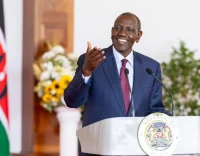Global payments technology company Visa and oil marketer Vivo Energy have announced a Pan African agreement to provide digital payment services to consumers across 15 African countries, where both companies operate.
The partnership is geared towards growing digital revenue by encouraging e-transactions. In the plan customers will be offered more Visa acceptance points at Shell branded service stations and convenience shops across Africa.
Vivo Energy Executive Vice President David Mureithi hailed the agreement as a game changer saying that his organisation and Visa share a common goal of helping consumers to pay with confidence, transparency and security.
“This partnership fits our overall strategy of offering innovative and convenient solutions to our customers, to help developing lasting relationships with them. Through this alliance with Visa, we want to expand the range of services we offer to our customers and also allow them to pay in a simple and easy way at our Shell service stations.” said Mr. Mureithi.
Visa President for Sub Saharan Africa Aida Diarra admitted that the agreement is a manifestation of the company’s efforts to cut over-reliance on payments via liquid cash.
“At the moment we encourage the development of a digital payments ecosystem for both individuals and businesses. Our partnership with Vivo Energy aligns with the kind of collaborations we look for – those that will help extend our reach into Africa’s commerce ecosystem as it changes and grows, and that will provide mutually beneficial business opportunities.” said Diarra.
Digital cashless transactions will enable the customers to control and monitor their expenses.
READ: FORMER CITIZEN TV ANCHOR JOHNSON MWAKAZI LANDS TOP TV JOB
The partnership will further enhance the customers’ experience by allowing them to pay electronically.
Vivo energy and Visa are optimistic that this move will spur the uptake of cashless payments in an environment where cash is still widely used by consumers and traders.
SEE ALSO: HOME, THE MOST DANGEROUS PLACE FOR WOMEN, UNODC STUDY SAYS













1 Comment